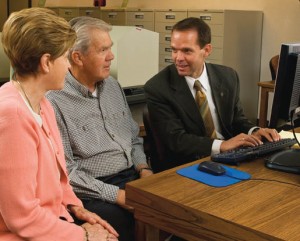 Thomas S. Monson, prophet of The Church of Jesus Christ of Latter-day Saints, whose members are sometimes called Mormons, loves to tell stories, and some of his favorite stories are from his own ancestors. Following are three stories that helped to shape his life.
Thomas S. Monson, prophet of The Church of Jesus Christ of Latter-day Saints, whose members are sometimes called Mormons, loves to tell stories, and some of his favorite stories are from his own ancestors. Following are three stories that helped to shape his life.
For many, the journey didn’t begin at Nauvoo, Kirtland, Far West, or New York, but rather in distant England, Scotland, Scandinavia, or Germany. Tiny children could not fully comprehend the dynamic faith which motivated their parents to leave behind family, friends, comfort, and security. A little one might ask, “Mommy, why are we leaving home? Where are we going?”
“Come along, precious one; we’re going to Zion, the city of our God.”
Between the safety of home and the promise of Zion stood the angry and treacherous waters of the mighty Atlantic. Who can recount the fear that gripped the human heart during those perilous crossings? Prompted by the silent whisperings of the Spirit, sustained by a simple yet abiding faith, they trusted in God and set sail on their journey. Europe was behind, America ahead.
On board one of those overcrowded and creaking vessels of yesteryear were my great-grandparents, their tiny family, and a few meager possessions. The waves were high, the voyage long, the quarters cramped. Tiny Mary had always been frail, but now with the passage of each day, her anxious mother saw the little one becoming weaker. She had a serious illness. There was no neighborhood drugstore, no doctor’s prescription, no modern hospital-just the steady roll of the tired old ship. Day after day worried parents watched for land, but there was none. Soon, Mary could not stand. Lips that were too weak to speak trembled with silent but eloquently expressed wonderment and fear. The end drew near. Little Mary peacefully passed beyond this vale of tears.
As family and friends crowded around on the open deck, the ship’s captain directed the service; and that precious, ever-so-small body, placed tenderly in a tear-stained canvas, was committed to the angry sea. Her strong father, in emotion-choked tones, comforted her grieving mother, repeating, ” ‘The Lord gave, and the Lord hath taken away; blessed be the name of the Lord.’ (Job 1:21.) We’ll see our Mary again!” (Thomas S. Monson, “‘Come, Follow Me’,” Ensign, Jul 1988, 2)
Two of my own great-grandparents fit the mold of many. Gibson and Cecelia Sharp Condie lived in Clackmannan, Scotland. Their families were engaged in coal mining-at peace with the world, surrounded by relatives and friends, and housed in fairly comfortable quarters in a land they loved. They listened to the message of the missionaries from The Church of Jesus Christ of Latter-day Saints and were converted to the depths of their very souls. They heard the call to journey to Zion and knew they must answer that call.
They sold their possessions and prepared for a hazardous voyage across the mighty Atlantic Ocean. With five children, they boarded a sailing vessel, all their worldly possessions in a tiny trunk. They traveled 3,000 miles across the waters, eight long, weary weeks on a treacherous sea-night and day nothing but water-eight weeks of watching and waiting, with poor food, poor water, and no help beyond the length and breadth of that small sailing vessel.
In the midst of this soul-trying situation, their son, Nathaniel, sickened and died. My great-grandparents loved that son just as much as your parents love you; and when his eyes were closed in death, their hearts were torn asunder. To add to their grief, the law of the sea must be obeyed. Wrapped in a canvas weighed down with iron, his body was consigned to a watery grave. As they sailed away, only those parents knew the crushing blow dealt to wounded hearts. Gibson Condie and his good wife were comforted by the words “Not my will, but Thy will, O Father.”
Thomas S. Monson, “Pioneers All,” Ensign, May 1997, 93
My mother’s father, Grandfather Thomas Condie, also taught me a powerful lesson which involved this same Old Bob, who came into our lives in an interesting way. He was a widower in his 80s when the house in which he rented a room was to be demolished. I heard him tell my grandfather his plight as the three of us sat on the old front-porch swing of my grandfather. With a plaintive voice, he said to Grandfather, “Mr. Condie, I don’t know what to do. I have no family. I have no place to go. I have little money.” I wondered how Grandfather would answer.
We just kept rocking the swing. Then Grandfather reached into his pocket and took from it an old leather purse from which, in response to my hounding, he had produced many a penny or nickel for a special treat. This time he removed a key and handed it to Old Bob.
Tenderly he said, “Bob, here is the key to that house I own next door. Take it. Move your things in. Stay as long as you like. There will be no rent to pay, and nobody will ever put you out again.”
Tears welled up in the eyes of Old Bob, coursed down his cheeks, then disappeared in his long, white beard. Grandfather’s eyes were also moist. I spoke no word, but that day my grandfather stood 10 feet tall. I was proud to bear his given name. Though I was but a boy, that lesson has had a powerful influence on my life.
Thomas S. Monson, “Examples of Great Teachers,” Ensign, Jun 2007, 106-12
Twitter •
